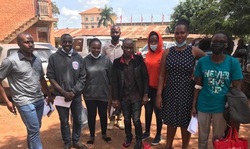Ugandan activists’ arrest slammed as threat to space for rights defenders
by Terna Gyuse
The recent arrests of staff of a Ugandan civil society organization, the Africa Institute for Energy Governance (AFIEGO), have been criticized as an attempt to stifle defenders of human rights and the environment in the East African country. AFIEGO has been prominent in campaigns against sugarcane plantations in the country’s western Bugoma Forest, as well as defending the rights of communities affected by Uganda’s growing oil industry.
Six members of AFIEGO’s staff — including a breastfeeding mother and another in need of regular treatment for a chronic medical condition — were arrested on Friday, Oct. 22, and held over the weekend.
They were previously arrested on Oct. 13, then released on bail. They were detained again when they reported to a police station in the capital, Kampala, in line with their bail conditions; though no charges were laid against them, they were held for longer than the 48-hour maximum permitted under Ugandan law.
Police said the staffers were arrested for operating a nongovernmental organization without a permit — a legal requirement for NGOs in Uganda introduced in 2016. In August, the NGO Bureau, which issues the permits, ordered AFIEGO and more than 50 other organizations to cease operations.
Speaking after his release on Monday, the organization’s CEO, Dickens Kamugisha, himself a lawyer, said that operating without a permit is not an offense under any the NGO Act or the penal code. “There is a penalty in the form of a fine but it is not an offense. So that is the offense that they said they were charging our staff [with]. When we reached Ninja Jinja Road police, we asked what was the offense that we committed? They could not tell us,” he said.
He said AFIEGO’s staff have been targeted for their activist work. “Since the beginning of the Tilenga project, the Kingfisher project, the EACOP and now the Bugoma Forest giveaway, many of our staff — especially in Buliisa and Hoima and along the EACOP in the greater Masaka area — many of our staff have been arrested, many are on police bond.”
AFIEGO is one of several organizations involved in defending the Bugoma Forest, 250 kilometers northwest of the capital. Hoima Sugar Ltd. is seeking to clear large portions of the biodiverse forest for a sugarcane plantation. The forest covers more than 40,000 hectares (99,000 acres), and is home to some 500 chimpanzees.
The organization is also involved in defending the rights of communities affected by the development of oil production in the Albertine region of the country, including the East African Crude Oil Pipeline (EACOP).
Allan Bariyo, the lawyer representing AFIEGO, said the organization is not even an NGO in terms of the 2016 act: it is incorporated as a company. He filed a motion on Oct. 25 asking the high court to declare that the NGO Bureau has no jurisdiction over AFIEGO.
“The systematic attacks are targeted at anyone working on electoral democracy, natural resources management, human rights and accountability,” Sarah Bireete, head of the Centre for Constitutional Governance, told media at a news conference organized by civil society leaders in Kampala on Oct. 26.
“The trend suggests that these [arrests] are targeted at citizens and their organizations, but also their funding partners and anyone supporting civic space and citizen organizing. This is showing the deteriorating human rights situation in the country.”













